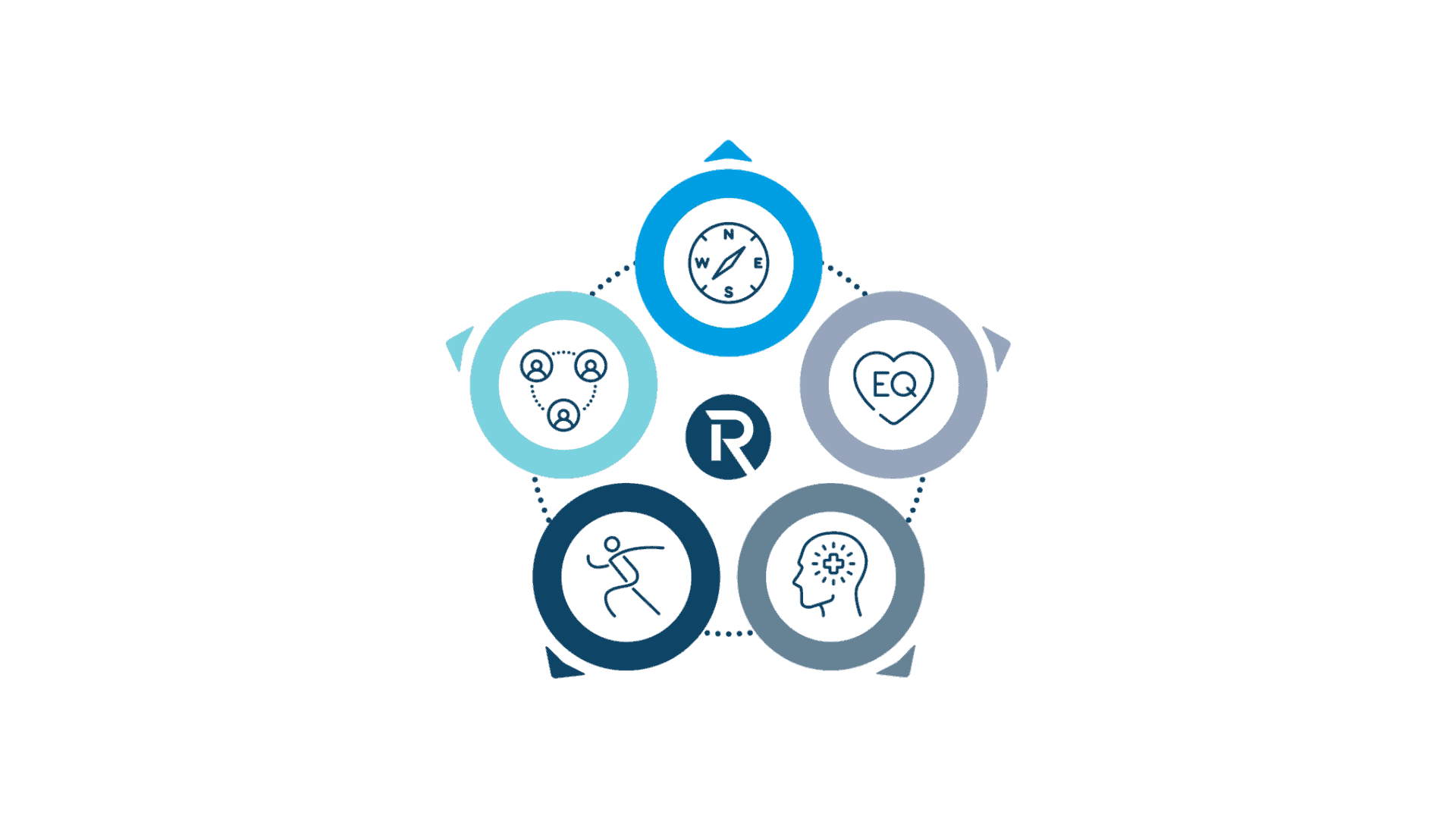With over 30 years of project and program management experience across diverse cultures my fascination of the varying ways people cope with stress has grown.
This has led me to recognize successful resilience behaviors and pursuing formal training to become a Resilience Coach. I am an accredited ResilienceBuilder® Coach, and have also received my Certificate of Advanced Studies as a Dipl. Resilienz Trainer CZO® through the Coaching Zentrum in Olten, Switzerland. As an Organizational Mentor with a Federal Diploma, I also apply my skills to professionally guide others. Through systematic development and practice, I’ve built a toolbox to help others tap into their inner strength, step outside their comfort zones, and find greater life satisfaction.
From managing work overload to navigating multinational cultures and overcoming career stagnation, ResilienceBuilder® offers a structured starting point to begin your own path to explore and strengthen your resilience and align the puzzle pieces you need to lead a happy and fulfilling life.
To start Exploring your own Resilience simply send me an email at [email protected]
My passion is to help others find their inner strength that it takes to master a happy and fulfilled life. In our society today, the basis for this is not only an optimal career but also the skill to manage the stress we are exposed to in all aspects of our life. We all have our talents, we all have a right to be successful in what we do, but the perfect picture looks different for each and every one of us.
I would love to be your guide and Resilience Trainer/Coach through the process of finding your own unique path.



In today’s fast-paced world, where demands from both work and personal life can often become overwhelming, the ability to bounce back from challenges and maintain a positive mindset is crucial.
Resilience training is a dynamic process that helps you and your teams effectively deal with life’s inevitable adversities, strengthen mental toughness, and maintain psychological wellness.
It’s a skill you can learn and strengthen, akin to physical fitness. Instead of succumbing to stress, depression, or unhealthy behaviors, resilience training equips you and your teams with valuable tools to manage challenges effectively.
Resilience training has become a contemporary workplace necessity that enables individuals and teams to manage stress, improve job performance and create a thriving, creative work culture.

Struggling with sleepless nights, unhealthy habits, and sacrificing time with loved ones, even working through weekends, can take a toll. If your whole team is overworked, increased sick leaves can breed animosity, lowering morale and causing missed deadlines due to mounting stress and discord. Resilience coaching provides coping skills and techniques for a healthier work-life balance, and more productive teams.

Working in a challenging multinational environment can be fraught with conflicts and misunderstandings arising from diverse cultures (e.g., US, Asian, African, Latin). This challenge can be experienced with constant shifts in direction and priorities, frequent rework or wasted efforts and ever-changing teams and leadership structures. Teams become unproductive, and overall dissatisfaction grows. Resilience coaching is instrumental in establishing sound communication skills that transcend cultural backgrounds, fostering effective collaboration and adaptability you, your team and your organization can thrive in.

In today's fast-paced business world, constant changes can lead to feeling overwhelmed, loosing productivity, and analysis paralysis within teams. To address this, organizations often launch multiple change programs that can clash and exacerbate the situation. Resilience training is crucial as it equips individuals with the skills to adapt, stay motivated, overcome analysis paralysis, and make effective decisions in high-pressure scenarios, ultimately fostering a healthier work environment.

When hard work goes unrecognized, promotions are elusive, and your intrinsic value is overlooked by leadership, it's easy to feel stuck in your career. Resilience training equips you with the skills and strategies needed to develop a structured approach for becoming visible to leaders and peers, particularly during decisive moments and key situations as things around you are changing.
Free Exploration call of max 30 Minutes
Regardless of what your current situation is, let’s set up a free exploration call of max 30 minutes to explore your situation and get to know each other
Start the process of Exploring and Engaging
Discover your personal resilience level with ResilienceBuilder® and start your own unique journey.



Since Burnout is increasingly common in the workplace, Resilience training, also known as resilience-building programs, has gained attention in the business world as a way to enhance employees’ ability to cope with stress, adapt to change, and thrive in challenging work environments.
According to The World Health Organization Statistics in 2019 globally, 5 % of the population suffers from some form of depression and 13% suffers from some form of mental illness.
Resilience training may contribute to a decrease in absenteeism as employees are better equipped to deal with stressors and maintain their overall well-being.
Based on the Statistics of The World Health Organization in 2019 the absence due to mental illness has an estimated cost of US$ 1 trillion each year for the global economy.
As Steve Howe, Founder of ResilienceBuilder® puts it:
“In future, organizations will need to provide a positive and flexible working environment with a culture supportive of change, adaptability and learning, along with a focus on relationships and networks.”
The key benefits are:
Numerous studies have examined how these programs can reduce stress levels and prevent burnout among employees. A large part of the studies have been performed in the Medical and First Responder sector, however the same approach is applicable in all sectors. Robin Brown, PhD, RN, and Alham Abuatip, PhD, RN summarize this in their article Resilience as a strategy to survive organizational change.
Study about Burnout and Absenteeism [PDF]
Some studies have explored the relationship between resilience training and job performance. They suggest that employees who are more resilient are better equipped to handle job-related challenges and may perform better as a result. Martin Seligman summarizes the effects of Building Resilience in the Harvard Business Review Article from the April 2011 Issue.
Study about Enhanced Job Performance [PDF]
Resilience training can lead to increased levels of employee engagement, which, in turn, can positively impact productivity, job satisfaction, and retention rates. In the fast changing world and the rapid digital transformations the companies are forced to undergo, in order to stay relevant, it’s imperative to help employees cope with this change. In the study from Anika Peschl, Nora Johanna Schueth published in 2022 in Science Direct summarize their findings.
Study about Increased Employee Engagement [PDF]
Resilience training is often incorporated into leadership development programs. Studies have investigated how building resilience in leaders can lead to more effective leadership, better decision-making, and improved team dynamics. Mandi Sherlock-Storey at Northumbria University in the UK has applied her Leadership training in the public sector middle management summarized in her 2013 Study documenting significant increase in resilience, hope, optimism and self-efficacy.
Study about Leadership Development [PDF]
Free Exploration call of max 30 Minutes
Regardless of what your current situation is, let’s set up a free exploration call of max 30 minutes to explore your situation and get to know each other
Start the process of Exploring and Engaging
Discover your personal resilience level with ResilienceBuilder® and start your own unique journey.

ResilienceBuilder® is a comprehensive Assessment tool that addresses the multifaceted nature of resilience, recognizing its unique expression in individuals, teams, and organizations. It focuses on five key areas: Purpose, Emotional Intelligence, Mental Intelligence, Physical Stamina, and Social Support. Start by gaining insights into your own and/or your team’s resilience with this valuable tool. This initial step provides you with useful insights for your own self-awareness and a clear understanding of individual and collective strengths and areas for growth that are the basis for developing your unique Resilience training program.

Systemic Coaching and mentoring techniques, combined with these newfound insights, is the perfect combination for you to embark on a transformative journey to strengthen your and / or your team’s resilience. Embrace personalized strategies and development plans that enhance everyone’s ability to bounce back from life’s challenges, fostering mental fortitude and emotional well-being. Strengthening resilience as a team fosters collaboration, adaptability, and shared well-being.

The transformative power of a retreat as the ideal starting point to recharge your batteries and begin practicing and integrating these newfound tools and approaches for a happier, more balanced life. Indulge in the rewards of a stress-free retreat thoughtfully designed for both individual and team development. This immersive experience enables everyone to apply their freshly acquired resilience skills within a tranquil and rejuvenating setting, reinforcing their ability to navigate life’s demands with grace and ease upon returning to the routine of daily life.
Resilience Training is like swimming with a pod of supportive dolphins, helping you adapt, find balance, conquer, adversity, and propel towards your determined future.
These five key areas include
Purpose, Emotional Intelligence, Mental Strength,
Physical Stamina, and Social Support.
Stress, burnout, and resilience is the #1 topic across organizations today and many people are struggling with the changes that impact us daily. Mental health issues are increasing globally with high level of illness and attrition in the workplace. Resilience determines how we tackle and overcome these new challenges, both as individuals and as teams.
Resilience is a multifaceted concept that varies greatly from person to person, team to team, and company to company. It’s an interplay of several key areas, each contributing to an individual or organization’s ability to bounce back from adversity and thrive amidst challenges.
ResilienceBuilder® is an Assessment tool based on extensive research to help individuals assess their current level of Resilience. It was developed by Steve Howe, who summarizes the key components of Resilience in the Model below. This model is fully aligned with the model developed by Corina Wustmann, who portrays resilience as a process that is impacted by our personal risk and protection factors and our ability to draw on our cognitive, emotional, motivational, social and vitality resources to handle the challenges.

Purpose, in the context of resilience, serves as the driving force that fuels our actions and decisions. It provides us with a clear sense of direction and motivation, acting as a compass that guides us through life's journey. It's the compelling 'why' that propels us forward, even in the face of adversity. Having a purpose instills a sense of meaning and significance in what we do, making our efforts feel worthwhile and valuable. It's the beacon of light that illuminates our path, giving us a reason to persevere and remain steadfast, despite the obstacles and challenges that come our way.
Emotional Intelligence is about much more than just understanding and managing emotions effectively. It's about harnessing the power of emotions to navigate life's ups and downs, build stronger relationships, and make better decisions. Emotional intelligence is the ability to recognize, understand, manage, and use your emotions in positive and constructive ways. It's about communicating your feelings assertively and respectfully, empathizing with the emotions of others, and coping with stress and change. High emotional intelligence is a powerful tool that can help you navigate through life's challenges with resilience and poise.
Mental strength is a multifaceted attribute that plays a crucial role in resilience. It equips individuals with the necessary problem-solving skills and cognitive flexibility to navigate through life's challenges. Mental strength empowers individuals to tackle obstacles head-on, make informed decisions, and adapt to changing circumstances. It's not just about having a high IQ or being smart; it's about being mentally prepared and equipped to deal with life's ups and downs. It involves being able to think clearly under pressure, maintain focus amidst distractions, and bounce back from failures. Mental strength is about having the mental agility to switch gears, the mental endurance to withstand hardship, and the mental fortitude to stay resilient in the face of adversity.
Physical Stamina is not merely about being physically active; it's about embracing a healthy lifestyle that allows you to relax, recharge, and maintain your energy levels. This includes engaging in regular exercise to keep your body fit and active, eating a balanced diet to provide your body with the necessary nutrients, getting ample sleep to allow your body to rest and rejuvenate, and practicing relaxation techniques to reduce stress and promote mental well-being. In addition, physical stamina hinges on our ability to listen to our bodies and understand when it's time to push our limits and when it's time to take a step back and rest. This balance is crucial in maintaining our overall health and well-being, enabling us to bounce back from physical and mental stressors with greater ease.
Social Support is a vital component of resilience, providing a network of relationships that offer help, encouragement, and a sense of belonging in both professional and personal environments. In the professional sphere, a supportive team can be a powerful stress buffer, enabling individuals to better manage work-related challenges. Teammates can provide practical help, share coping strategies, offer a listening ear, or simply provide a sense of camaraderie that can significantly alleviate stress and promote mental well-being.

Purpose, in the context of resilience, serves as the driving force that fuels our actions and decisions. It provides us with a clear sense of direction and motivation, acting as a compass that guides us through life's journey. It's the compelling 'why' that propels us forward, even in the face of adversity. Having a purpose instills a sense of meaning and significance in what we do, making our efforts feel worthwhile and valuable. It's the beacon of light that illuminates our path, giving us a reason to persevere and remain steadfast, despite the obstacles and challenges that come our way.
Emotional Intelligence is about much more than just understanding and managing emotions effectively. It's about harnessing the power of emotions to navigate life's ups and downs, build stronger relationships, and make better decisions. Emotional intelligence is the ability to recognize, understand, manage, and use your emotions in positive and constructive ways. It's about communicating your feelings assertively and respectfully, empathizing with the emotions of others, and coping with stress and change. High emotional intelligence is a powerful tool that can help you navigate through life's challenges with resilience and poise.
Mental strength is a multifaceted attribute that plays a crucial role in resilience. It equips individuals with the necessary problem-solving skills and cognitive flexibility to navigate through life's challenges. Mental strength empowers individuals to tackle obstacles head-on, make informed decisions, and adapt to changing circumstances. It's not just about having a high IQ or being smart; it's about being mentally prepared and equipped to deal with life's ups and downs. It involves being able to think clearly under pressure, maintain focus amidst distractions, and bounce back from failures. Mental strength is about having the mental agility to switch gears, the mental endurance to withstand hardship, and the mental fortitude to stay resilient in the face of adversity.
Physical Stamina is not merely about being physically active; it's about embracing a healthy lifestyle that allows you to relax, recharge, and maintain your energy levels. This includes engaging in regular exercise to keep your body fit and active, eating a balanced diet to provide your body with the necessary nutrients, getting ample sleep to allow your body to rest and rejuvenate, and practicing relaxation techniques to reduce stress and promote mental well-being. In addition, physical stamina hinges on our ability to listen to our bodies and understand when it's time to push our limits and when it's time to take a step back and rest. This balance is crucial in maintaining our overall health and well-being, enabling us to bounce back from physical and mental stressors with greater ease.
Social Support is a vital component of resilience, providing a network of relationships that offer help, encouragement, and a sense of belonging in both professional and personal environments. In the professional sphere, a supportive team can be a powerful stress buffer, enabling individuals to better manage work-related challenges. Teammates can provide practical help, share coping strategies, offer a listening ear, or simply provide a sense of camaraderie that can significantly alleviate stress and promote mental well-being.




Free Exploration call of max 30 Minutes
Regardless of what your current situation is, let’s set up a free exploration call of max 30 minutes to explore your situation and get to know each other
Start the process of Exploring and Engaging
Discover your personal resilience level with ResilienceBuilder® and start your own unique journey.
Resilience training is a structured program designed to enhance an individual’s or a team’s ability to bounce back from adversity, adapt to challenges, and maintain well-being in the face of stress and adversity.
Stress and burnout are increasing in today’s challenging world. Increased levels of absence due to mental illness are estimated to cost the global economy $1 trillion each year. Our ability to cope and adapt is becoming critically important for our career success and overall well-being. Building resilience is key to a happier balanced life and preventing illness.
Improving resilience can lead to reduced stress, increased emotional well-being, better problem-solving abilities, enhances relationships, improved adaptability and a greater sense of purpose in life. Resilient Teams are more creative and productive and demonstrate greater loyalty to their Employer.
Resilience can be developed and strengthened through training and practice. While some people may naturally possess more resilience, it’s a skill that can be cultivated by anyone, just like building muscle strength and physical fitness.
Resilience training can benefit people of all ages and backgrounds, including
students, professionals, athletes, and anyone seeking to better manage stress and adversity. Resilience training can be done in a 1:1 setting, and is also particularly effective when training entire teams.
Resilience training typically includes components such as stress management
techniques, emotional regulation strategies, problem-solving skills, social support, and self-care practices. It provides tools and exercises that can be applied both personally as well as in professional settings.
Resilience training can be delivered through various methods, including workshops, one-to-one coaching, in both physical and online settings.
Evidence-based approaches to resilience training may include cognitive-behavioral therapy (CBT), mindfulness meditation, positive psychology interventions, and resilience-building workshops. Proactively building the skill of individuals and teams generally increases job satisfaction, improves job performance and lowers sick days.
My passion is to help others find their inner strength that it takes to master a happy and fulfilled life. In our society today, the basis for this is not only an optimal career but also the skill to manage the stress we are exposed to in all aspects of our life. We all have our talents, we all have a right to be successful in what we do, but the perfect picture looks different for each and every one of us.
But why am I qualified to help you?
I am a results-oriented IT professional with background in Consulting, PMI certification and extensive experience in building restructuring Projects and Programs to deliver Business Results in very diverse Industries. This just a short illustration to show the levels of pressure and stress I have been exposed to:
While working through the challenges of the various projects and programs, my passion grew more and more for understanding and helping project team members, executives and a variety of stakeholders to deliver their best work, while not getting burned out. This passion grew so much I wanted to learn a more formal approach to this and have delved into the topic with various Continuing Education Certificates and courses:
The time it takes to see the benefits of resilience training can vary from person
to person, but consistent practice over weeks or months is often necessary to
develop and strengthen resilience skills. Just like physical fitness, it requires lifelong practice.
While resilience training can reduce the risk of developing mental health issues and improve one’s ability to cope with stress, it may not guarantee prevention in all cases. It is a valuable tool for mental health promotion and resilience enhancement, and is sometimes used in combination with therapy or counseling.
Resilience training may not work equally well for everyone, and some individuals may require more intensive therapeutic interventions. Additionally, the effectiveness of resilience training may depend on the quality of the program and the individual’s commitment to practicing the techniques.
Overused strengths can become a weakness. If an individual becomes too resilient, they may persevere in working towards unattainable goals, or become so adaptive, they no longer have their own will.
Organizations can introduce resilience training programs, workshops, and resources to support employee well-being, reduce stress, and enhance job satisfaction. Promoting a culture of resilience can lead to better employee performance and retention.
Resilience training is typically an ongoing practice. Building and maintaining resilience is a lifelong journey that requires consistent effort and adaptation to changing circumstances. Training and Coaching provides the tools, but much like physical fitness it requires ongoing commitment.
Practical tips for building resilience include developing a strong support network, practicing mindfulness, setting realistic goals, maintaining a healthy lifestyle, and seeking professional help when needed. However each person’s situation is unique, and therefore the more effective approach is to develop a customized set of tools and practices.
Resilience training is distinct from therapy or counseling. If focuses on building skills and strategies to handle life’s challenges pro-actively, whereas therapy often delves into deeper emotional issues and mental health concerns. However, they can complement each other.
Avita Yoga is a moving meditation that heals in body and mind. Nearly anyone can benefit because it uses attainable shapes to rejuvenate tissues in and around the joints. The result is more health, mobility, and peace of mind.
The core foundation of Avita Yoga is establishing a healing state of mind. For thousands of years, yoga was all about healing the mind, which makes it an experience, not something to accomplish! Healing happens in the present moment, facilitated by time, introspection, and doable yoga shapes. The body becomes a vehicle to quickly access a healed state of mind, a key ingredient for lasting results.
Breathwork, offers a variety of benefits for the mind and body. Through conscious and controlled breathing we can regulate our nervous system and achieve a state of relaxation and well-being. In addition, breathwork can reduce stress and anxiety because it activates the parasympathetic nervous system, which is responsible for relaxation and regeneration. Through regular breathwork practices, we can increase our emotional resilience, improve our focus, and create a deeper connection with ourselves.
Breathwork also has positive effects on mental health. By bringing our attention to our breath and consciously regulating it, we can break through negative thought patterns and achieve greater clarity of mind. The deep breathing in Breathwork can help bring us into the present moment and free us from distracting thoughts or worries
Lomi Lomi Massage is a traditional massage form from Hawaii, which is part of an ancient healing ritual. It is celebrated by the indigenous people during phases of stagnation, illness, and as preparation for significant transitional periods in life (such as puberty, pregnancy, postpartum, before important decisions or new life tasks).
During the Lomi Lomi massage, long, flowing massage strokes performed with the forearms alternate with gentle joint mobilization and deep body and fascia work. Like the waves of the ocean, these connecting movements powerfully and gently harmonize the entire energy system.
Lomi Lomi is guided by selfless presence, non-judgmental acceptance, and loving dedication of the masseur, as well as the recipient’s willingness to be fully present and receptive.
The Healing Power of Lomi Lomi Massage
Painful experiences, ingrained thought patterns and suppressed emotions are stored in our bodies in the form of tension and pain. According to the Hawaiian perspective, illness arises when the free flow of energy is blocked due to chronic tension.
During this special massage ritual, the body becomes softer and more receptive to the free flow of life force and joy. Suppressed emotions can release, deep relaxation spreads, and physical and emotional healing occurs.
The mindful touch helps everyone to treat themselves more lovingly and respectfully, making them feel more alive, lighter, and more comfortable in their own bodies.
What can you expect?
After a ritual cleansing and preparation, you will be massaged and moved to the sound of Hawaiian music using high-quality natural oils. You are welcome to bring your own favorite oil if you prefer.
Starting with the back, the front, head, and foot reflex zones will also be treated. The intimate area will always be covered.
Special attention is always given to the spine and major joints (shoulders, hips), which are important energy centers. By making all the joints supple, energy can flow more easily through the body.
Finally, you have time to sense the ongoing effects in your body and the inner changes that have occurred.
Lomi Lomi will be provided by https://www.lomi-spirit.de/
Aquatic bodywork also known as aquatic bodywork, is a wonderful form of therapy in which gentle, flowing movements are performed in warm water. The primary benefit of this water-based technique is the deep relaxation and feeling of weightlessness it provides. The body experiences a sense of looseness and ease as it undergoes gentle stretching, movements, and massage techniques.
Once the body is sufficiently relaxed, the underwater part of the therapy begins. Immersing oneself underwater can evoke feelings of freedom, relaxation, and connection with the environment. This practice has the potential to expand awareness, strengthen intuition, and foster a profound connection with oneself and the surrounding nature.
Breathwork, offers a variety of benefits for the mind and body. Through conscious and controlled breathing we can regulate our nervous system and achieve a state of relaxation and well-being. In addition, breathwork can reduce stress and anxiety because it activates the parasympathetic nervous system, which is responsible for relaxation and regeneration. Through regular breathwork practices, we can increase our emotional resilience, improve our focus, and create a deeper connection with ourselves.
Breathwork also has positive effects on mental health. By bringing our attention to our breath and consciously regulating it, we can break through negative thought patterns and achieve greater clarity of mind. The deep breathing in Breathwork can help bring us into the present moment and free us from distracting thoughts or worries
Avita Yoga is a moving meditation that heals in body and mind. Nearly anyone can benefit because it uses attainable shapes to rejuvenate tissues in and around the joints. The result is more health, mobility, and peace of mind.
The core foundation of Avita Yoga is establishing a healing state of mind. For thousands of years, yoga was all about healing the mind, which makes it an experience, not something to accomplish! Healing happens in the present moment, facilitated by time, introspection, and doable yoga shapes. The body becomes a vehicle to quickly access a healed state of mind, a key ingredient for lasting results.